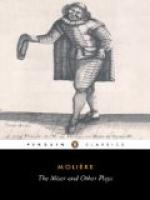|
This section contains 6,824 words (approx. 23 pages at 300 words per page) |

|
SOURCE: “Harpagon: The Paradox of Miserliness,” in Papers on French Seventeenth Century Literature, Vol. XXII, No. 43, 1995, pp. 555-69.
In the following essay, McCann maintains that the character of Harpagon, of Molière's L'Avare, rises above pure meanness.
Being mean is not funny. We despise those whom we consider to be tight-fisted. People such as Harpagon, therefore, are unpromising subjects for comedy. Yet, as Pierre Gaxotte has pointed out:
Par bonheur, Molière a éclairé son homme de tant de façons, lui a prêté tant de postures que non seulement il fait rire de ce qui aurait pu paraître odieux, mais qu'Harpagon se trouve être de tous les temps, du nôtre comme du sien.1
Few would dispute this. The status of L'Avare, unlike Le Misanthrope, is in no doubt: it is a comedy. There is, as Gaxotte says, a density of characterization that raises Harpagon...
|
This section contains 6,824 words (approx. 23 pages at 300 words per page) |

|


